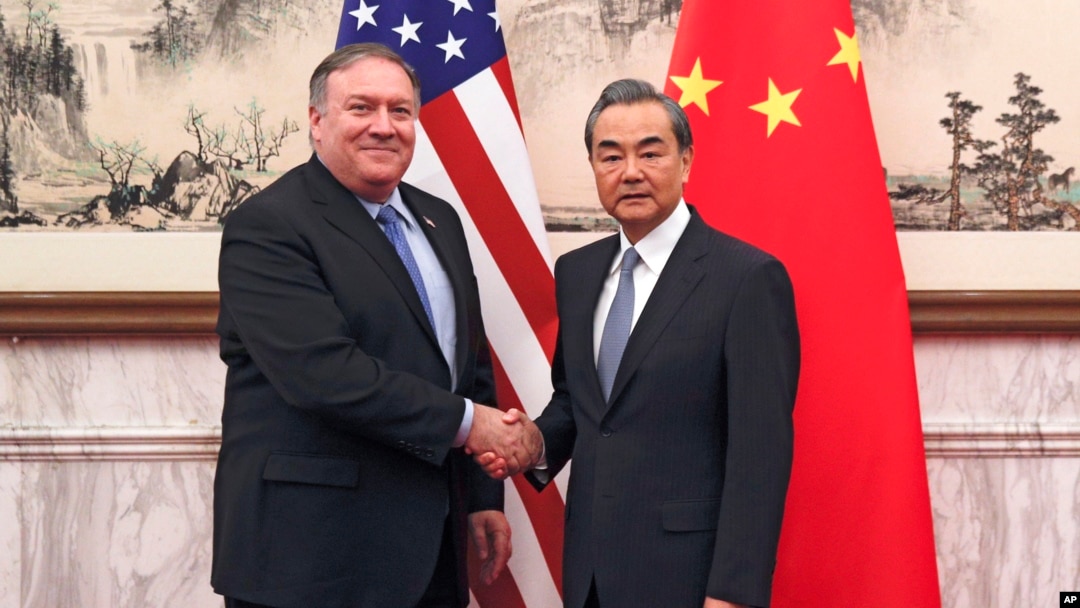U.S. Secretary of State Mike Pompeo told his Chinese counterpart Monday the United States has "grave concerns" about China's actions on several fronts, including human rights and the South China Sea.
"We have a fundamental disagreement," Pompeo told Chinese Foreign Minister Wang Yi in Beijing.
Both men used unusually blunt language for such a diplomatic setting.
Wang accused the U.S. of escalating trade tensions with China, and said Washington was dealing with Taiwan in a way that "harms China's core interests." Beijing considers the self-ruled island part of its territory. The U.S. is obligated to come to Taiwan's aid if China tries to take back the island by force.
Monday's meeting came days after U.S. Vice President Mike Pence delivered a speech accusing China of military aggression, commercial theft, rising human rights violations and trying to interfere in upcoming U.S. elections.
A U.S. readout issued after Monday's meeting said Pompeo "directly addressed areas where the United States and China do not agree, including on the South China Sea and human rights. He emphasized the importance of maintaining cross-Strait peace and stability."
Both men also spoke on the need for greater cooperation.
WATCH: US-China relations
Your browser doesn’t support HTML5
Pompeo Says US and China Have a 'Fundamental Disagreement'
"We believe China and the U.S. should stick to the correct path of cooperation and win-win, rather than be mired in a wrong path full of conflicts and confrontations," Wang said.
The U.S. and China are also in the middle of a trade war in which both sides have slapped billions of dollars in tariffs on each other's imports.
"I think part of the Chinese anger that Wang Yi displayed was a sign that the Chinese are getting very uncomfortable with the trade war, and that they always thought that the United states would stop. And that clearly is not what the United States is doing," Victor Cha, a professor at Georgetown University and former director for Asian Affairs in the White House's National Security Council, told VOA.
Cha said he foresees the U.S. -Chinese relationship on what he calls a "very confrontation track," at least though next month's U.S. elections, if not longer.
North Korea cooperation
One area of clear cooperation is North Korea. The U.S. is trying to convince the North to give up its nuclear weapons. China is North Korea's closest ally.
The State Department said Pompeo and Wang "reaffirmed their shared resolve to achieving the final, fully verified denuclearization of the DPRK, as agreed to by Chairman Kim (Jong Un) in Singapore." The North Korean leader and U.S. President Donald Trump met for the first time there in June for a historic summit.
"The United States and China remain unified on our pressure campaign and are committed to a bright future for the DPRK if Pyongyang denuclearizes quickly," the statement added.
Pompeo traveled to China from South Korea, where he met with President Moon Jae-in to discuss North Korea. Moon later thanked Pompeo for the visit and expressed well wishes for a potential second summit between Kim and Trump.
Pompeo said that while he was in Pyongyang, he and Kim "refined options for the location and date" for the "upcoming second summit."
Pompeo later said in a tweet, "Had a good trip to #Pyongyang to meet with Chairman Kim. We continue to make progress on agreements made at Singapore Summit. Thanks for hosting me and my team @StateDept."
Pompeo had said the goal of his meeting with North Korea was "to make sure we understand what each side is truly trying to achieve, and how we can deliver against the commitments that were made" in Singapore.
Ira Mellman, Kenneth Schwartz contributed to this report.


